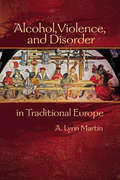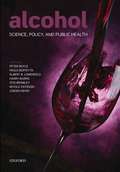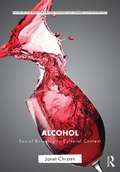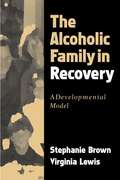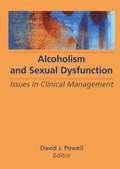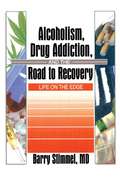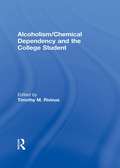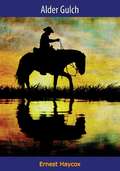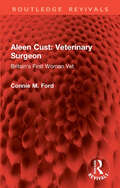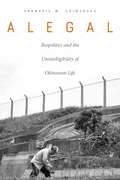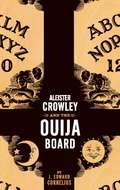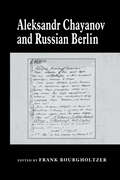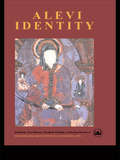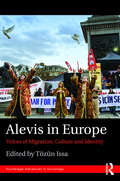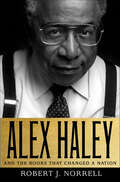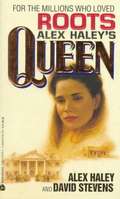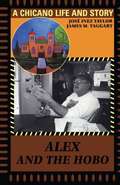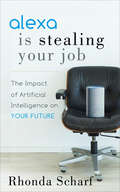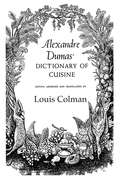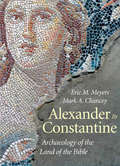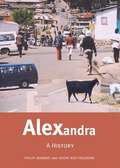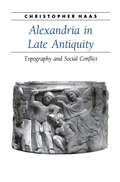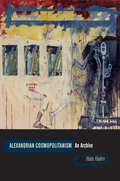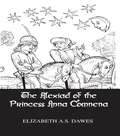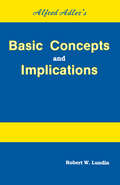- Table View
- List View
Alcohol, Violence, and Disorder in Traditional Europe (Early Modern Studies)
by A. Lynn MartinTraditional Europe had high levels of violence and of alcohol consumption, both higher than they are in modern Western societies, where studies demonstrate a link between violence and alcohol. A. Lynn Martin uses an anthropological approach to examine drinking, drinking establishments, violence, and disorder, and compares the wine-producing south with the beer-drinking north and Catholic France and Italy with Protestant England, and explores whether alcohol consumption can also explain the violence and disorder of traditional Europe.Both Catholic and Protestant moralists believed in the link, and they condemned drunkenness and drinking establishments for causing violence and disorder. They did not advocate complete abstinence, however, for alcoholic beverages had an important role in most people's diets. Less appreciated by the moralists was alcohol's function as the ubiquitous social lubricant and the increasing importance of alehouses and taverns as centers of popular recreation.The study utilizes both quantitative and qualitative evidence from a wide variety of sources to question the beliefs of the moralists and the assumptions of modern scholars about the role of alcohol and drinking establishments in causing violence and disorder. It ends by analyzing the often-conflicting regulations of local, regional, and national governments that attempted to ensure that their citizens had a reliable supply of good drink at a reasonable cost but also to control who drank what, where, when, and how.No other comparable book examines the relationship of alcohol to violence and disorder during this period.
Alcohol: Science, Policy and Public Health
by Paolo Boffetta Peter Boyle Albert B. Lowenfels Harry Burns Otis Brawley Witold Zatonski Jürgen RehmAlcohol has always been an issue in public health but it is currently assuming increasing importance as a cause of disease and premature death worldwide. Alcohol: Science, Policy, and Public Health provides an interdisciplinary source of information that links together, the usually separate fields of, science, policy, and public health. This comprehensive volume highlights the importance of bringing scientific knowledge to bear in order to strengthen and develop alcohol public policy. The book looks at the historical evolution of alcohol consumption in society, key early studies of alcohol and disease, and the cultural and social aspects of alcohol consumption. It then goes on to cover the chemistry and biology of alcohol, patterns of consumption, gender and age-related issues, alcohol and injury, alcohol and cancer and non-malignant disease, and various current therapeutic aspects. The book concludes with a section on alcohol policy, looking at issues of poverty, the availability of alcohol and alcohol control measures. This major reference, written by international leaders in the fields of alcoholism and alcohol policy, provides a comprehensive study of one of the foremost health problems in the world, and represents the highest standards of research within the field. It will be valuable to physicians and health professionals involved with patients with alcohol-related problems, scientists, public health specialists, health policy specialists, researchers and legislators as well as students of public health.
Alcohol: Social Drinking in Cultural Context (Routledge Series for Creative Teaching and Learning in Anthropology)
by Janet ChrzanAlcohol: Social Drinking in Cultural Context critically examines alcohol use across cultures and through time. This short text is a framework for students to self-consciously examine their beliefs about and use of alcohol, and a companion text for teaching the primary concepts of anthropology to first-or second year college students.
Alcoholic Family in Recovery
by Stephanie Brown Virginia M. LewisMost treatments for alcoholism have focused on abstinence as their final goal and emphasize brief interventions with the addicted individual. But family relationships change dramatically when the alcoholic stops drinking in fact, stress, turmoil, and uncertainty are the norm. This volume details how to help families regroup after abstinence, ride out periods of emotional upheaval, and find their way to establishing a more stable, yet flexible, family system. Using a compelling case-study format to illustrate the process of change, the book presents the moving personal experiences of families at different stages of the recovery process. Expanding the therapist's role to include psychoeducation and supportive counseling, the authors provide pointers for assessment at key stages of recovery and guide clinicians through bringing about lasting change.
Alcoholism and Sexual Dysfunction: Issues in Clinical Management
by Bruce CarruthExperts provide specific methodologies for clinicians working with recovering alcoholics and their families. This landmark study of sexual issues in alcoholism treatment addresses impotence in male alcoholics, the sexual dynamics of the client-counselor relationship, homosexual alcoholics, and many other important issues.
Alcoholism, Drug Addiction, and the Road to Recovery: Life on the Edge
by Barry StimmelGain a fuller understanding of substance addiction and treatment options!Originally published in 1992 as The Facts About Drug Use, this updated edition contains new information about the effects of alcohol and recreational, mood-altering drugs on the body. The multiple causes of drug use and the options available to those dependent on drugs as a way of life are thoroughly and clearly described. Drug use affects nearly 1 out of 2 Americans and cuts across every social and economic boundary. The effects of addiction on the individual are great, and the cumulative effects on society are staggering. Knowledge of the adverse effects of mood-altering drugs and why and how they are used excessively is a centerpiece of this book. It presents, intelligently and interestingly, ways to identify persons at risk and identify problems that the addicted encounter in attempts to become drug free. Alcoholism, Drug Addiction, and the Road to Recovery: Life on the Edge is an essential tool in both finding available resources for drug users and developing appropriate responses to today's drug problem.This remarkable, well-referenced book enables those with little or no background in science or health care to understand the complex issues surrounding drug use. It provides current, reliable, and unbiased information on methods for dealing with dependency upon alcohol and central nervous system depressants, hallucinogens, heroin, nicotine, marijuana, caffeine, amphetamines, designer drugs like Ecstasy, and steroids. A glossary listing common street names for drugs will be invaluable to those interested in identifying specific substances.This comprehensive volume will show you: who typically uses drugs and the reasons why they do how to classify mood-altering drugs how to identify and treat drug dependency areas of special concern such as multiple drug use, AIDS and drug use, drugs and pregnancy, drugs and sports, and drug testing technologyChapter by chapter, this nonjudgmental book helps readers develop a better understanding of the effects of mood-altering substances and the reasons many continue to use them despite serious consequences. This is a valuable key to the nature of dependency and addiction, and the external forces (including poverty and homelessness) that promote such behavior.
Alcoholism/Chemical Dependency and the College Student
by Leighton Whitaker Timothy RivinusProfessionals who work with college students--and college students themselves--address the current epidemic of drug use on college campuses in this timely book. In acknowledging that substance abuse problems proliferate during college and on into adult life when they then affect the next generation, the outstanding group of contributors offers forthright and clear descriptions, explanations, and suggestions for helping students, including examples of university services that have proven successful in dealing with student substance abuse. This helpful book aims to reverse the trend of ambivalence and confusion of administrators and college counselors regarding the area of substance use disorder by providing practical intervention strategies.
Alder Gulch
by Ernest HaycoxBLAZIN’ JUSTICEVirginia City, Montana. Gold fever struck hard in 1863, with miners pannin’ for nuggets up and down the length of nearby Alder Gulch. But a gang of guntoughs was ridin’ them roughshod. With the law lookin’ the other way, the sidewinders dealt out hot lead for a man shippin’ his poke or even carryin’ gold dust for his grubstake.Jeff Pierce had been on the hard dodge since Portland, until he staked his claim at Alder Gulch. As a favor, he carried another miner’s poke through the forty miles of danger to Bannack, only to find that the scummy gunhawks had filled the old-timer with buckshot. Now the varmints had Pierce as a marked man. The gang was fixin’ for a showdown, but they’d be a mite less cocky if they knew the charge he was up for—murder!“Ernest Haycox is a master and ALDER GULCH is one of his best.”—Dallas Times Herald
Aleen Cust Veterinary Surgeon: Britain's First Woman Vet (Routledge Revivals)
by Connie M. FordOriginally published in 1990, this book is a valuable contribution to the history of the veterinary profession in Great Britain and Ireland. Connie Ford’s book is a reminder of the great social changes that have taken place since Aleen Cust was born in 1868. When Aleen Cust entered the New Veterinary College, Edinburgh in 1895, and was later refused permission to sit the examinations of the Royal College of Veterinary Surgeons, no British woman had the vote. To the women students, only admitted to the London Veterinary College in 1927, she was a legend and an example. Now, a new generation of veterinarians, will find this account of the life and times of a truly remarkable woman a revelation.
Alegal: Biopolitics and the Unintelligibility of Okinawan Life
by Annmaria M. ShimabukuOkinawan life, at the crossroads of American militarism and Japanese capitalism, embodies a fundamental contradiction to the myth of the monoethnic state. Suspended in a state of exception, Okinawa has never been an official colony of the Japanese empire or the United States, nor has it ever been treated as an equal part of Japan. As a result, Okinawans live amid one of the densest concentrations of U.S. military bases in the world. By bringing Foucauldian biopolitics into conversation with Japanese Marxian theory, Alegal uncovers Japan’s determination to protect its middle class from the racialized sexual contact around its mainland bases by displacing them onto Okinawa, while simultaneously upholding Okinawa as a symbol of the infringement of Japanese sovereignty.This symbolism, however, has provoked ambivalence within Okinawa. In base towns that facilitated encounters between G.I.s and Okinawan women, the racial politics of the United States collided with the postcolonial politics of the Asia Pacific. Through close readings of poetry, reportage, film, and memoir on base-town life since 1945, Shimabuku traces a continuing failure to “become Japanese.” What she discerns instead is a complex politics surrounding sex work, tipping with volatility along the razor’s edge between insurgency and collaboration. At stake in sovereign powers’ attempt to secure Okinawa as a military fortress was the need to contain alegality itself—that is, a life force irreducible to the legal order. If biopolitics is the state’s attempt to monopolize life, then Alegal is a story about how borderland actors reclaimed its power for themselves.
Aleister Crowley and the Ouija Board
by J. Edward CorneliusPart fascinating history and part practical manual, this engaging guide takes the position that the Ouija Board is indeed as powerful as its detractors claim, revealing the dark secrets and hidden truths of this curious, enduring "game."
Aleksandr Chayanov and Russian Berlin
by Frank BourgholtzerAleksandr Chayanov lived and worked in England and Germany in the 1920s, when he wrote many letters. He was also forced to write autobiographical material after his arrest in 1930. Frank Bourgholtzer uses this material in his account of this Russian utopian.
Alevi Identity: Cultural, Religious and Social Perspectives
by Catharina Raudvere Tord Olsson Elisabeth OzdalgaIn the rising momentum for new and reformulated cultural identities, the Turkish Alevi have also emerged on the scene, demanding due recognition. In this process a number of dramatic events have served as important milestones: the clashes between Sunni and Alevi in Kahramanmaras in 1979 and Corum in 1980, the incendiarism in Sivas in 1992, and the riots in Istanbul (Gaziosmanpasa) in 1995. Less evocative, but in the long run more significant, has been the rising interest in Alevi folklore and religious practices. Questions have also arisen as to what this branch of Islamic heterodoxy represents in terms of old and new identities. In this book, these questions are addressed by some of the most prominent scholars in the field.
Alevis in Europe: Voices of Migration, Culture and Identity (Routledge Advances in Sociology)
by Tözün IssaThe Alevis are a significant minority in Turkey, and now also in the countries of Western Europe. Over the past century, many of them have migrated from rural enclaves on the Anatolian plateau to the great cities of Istanbul and Ankara, and from there to the countries of the European Union. This book asks who are they? How do they construct their identities – now and in the past; in Turkey and in Europe? A range of scholars, writing from sociological, historical, socio-psychological and political perspectives, present analysis and research that shows the Alevi communities grouping and regrouping, defining and redefining – sometimes as an ethnic minority, sometimes as religious groups, sometimes around a political philosophy - contingently responding to circumstances of the Turkish Republic’s political position and to the immigration policies of Western Europe. Contributors consider Alevi roots and cultural practices in their villages of origin; the changes in identity following the migration to the gecekondu shanty towns surrounding the cities of Turkey; the changes consequent on their second diaspora to Germany, the UK, Sweden and other European countries; and the implications of European citizenship for their identity. This collection offers a new and significant contribution to the study of migration and minorities in the wider European context.
Alex Haley and the Books That Changed a Nation
by Robert J. NorrellThis in-depth biography chronicles the life, career, and enduring influence of the author of Roots and The Autobiography of Malcom X.A New York Times Sunday Book Review Editors’ ChoiceAlex Haley’s influence on American society in the second half of the twentieth century cannot be overstated. His two great works radically changed the way white and black Americans viewed each other and their country. This biography follows Haley from his childhood in segregated Tennessee to the creation of those two seminal works, and the fame and fortune that followed.After discovering a passion for writing in the Navy, Haley became a star journalist in the heyday of magazine profiles. At Playboy, he profiled everyone from Martin Luther King and Miles Davis to Johnny Carson and Malcolm X—which led to their collaboration on The Autobiography of Malcolm X.Roots was a more personal project for Haley. The book and subsequent miniseries ignited an ongoing craze for family history and made Haley one of the most famous writers in the country. This deeply researched biography delves into his literary craft, his career as one of the first African American star journalists, and the turbulent times in which he lived.
Alex Haley's Queen: The Story of an American Family
by Alex HaleyThe author of Roots chronicles the remarkable history of the other side of his family, especially his extraordinary grandmother, Queen, the daughter of a slave and a white slave owner
Alex and the Hobo: A Chicano Life and Story
by Taylor James M. Taggart José InezWhen a ten-year-old boy befriends a mysterious hobo in his southern Colorado hometown in the early 1940s, he learns about evil in his community and takes his first steps toward manhood by attempting to protect his new friend from corrupt officials. Though a fictional story, Alex and the Hobo is written out of the life experiences of its author, José Inez (Joe) Taylor, and it realistically portrays a boy's coming-of-age as a Spanish-speaking man who must carve out an honorable place for himself in a class-stratified and Anglo-dominated society. In this innovative ethnography, anthropologist James Taggart collaborates with Joe Taylor to explore how Alex and the Hobo sprang from Taylor's life experiences and how it presents an insider's view of Mexicano culture and its constructions of manhood. They frame the story (included in its entirety) with chapters that discuss how it encapsulates notions that Taylor learned from the Chicano movement, the farmworkers' union, his community, his father, his mother, and his religion. Taggart gives the ethnography a solid theoretical underpinning by discussing how the story and Taylor's account of how he created it represent an act of resistance to the class system that Taylor perceives as destroying his native culture.
Alexa Is Stealing Your Job: The Impact of Artificial Intelligence on Your Future
by Rhonda ScharfThis guided tour of how AI will impact the future of work explores the ways both companies and employees can adapt to the new normal. Artificial intelligence is taking over. Ask Alexa to call a client or confirm your schedule for the day and she does so immediately. Ask her a question, give her a command, or just share a joke together, and she becomes your new best employee—one who never makes a mistake or calls out sick. In other words, Alexa can nix the need for millions of front-line workers. As companies race to keep up with advances in AI, employees must race just to keep their job. Author and public speaker Rhonda Scharf shows readers how a willingness to adapt to the new normal keeps both businesses and their employees relevant in these changing times. Alexa Is Stealing Your Job reveals what the future entails by diving into the world of AI and exploring how it impacts lives, careers, and the future.
Alexander Dumas Dictionary Of Cuisine
by DumasFirst published in 2005. A cookery book by the author of The Three Muskateers and The Count of Monte Cristo may seen an improbability. Yet Alexandre Dumas was an expert cook- his love of food was said to be equalled only by his love of women - and his Great Dictionary of Cuisine, written to be read by worldly people and used by professionals and published posthumously in 1873, it is a masterpiece in its own right. This abridged version of the Dictionary is designed to be both useful and entertaining. A glance at the Index will show that there are hundreds of recipes - for sauces, soups, meat, fish, eggs, poultry and game - not all kitchen-tested with modern ingredients, but well within the scope of an experienced and imaginative cook.
Alexander to Constantine
by Eric M. Meyers Mark A. ChanceyDrawing on the most recent, groundbreaking archaeological research, Eric M. Meyers and Mark A. Chancey re-narrate the history of ancient Palestine in this richly illustrated and expertly integrated book. Spanning from the conquest of Alexander the Great in the fourth century BCE until the reign of the Roman emperor Constantine in the fourth century CE, they synthesize archaeological evidence with ancient literary sources (including the Bible) to offer a sustained overview of the tumultuous intellectual and religious changes that impacted world history during the Greco-Roman period. The authors demonstrate how the transformation of the ancient Near East under the influence of the Greeks and then the Romans led to foundational changes in both the material and intellectual worlds of the Levant. Palestine's subjection to Hellenistic kingdoms, its rule by the Hasmonean and Herodian dynasties, the two disastrous Jewish revolts against Rome, and its full incorporation into the Roman Empire provide a background for the emergence of Christianity. The authors observe in the archaeological record how Judaism and Christianity were virtually undistinguishable for centuries, until the rise of imperial Christianity with Emperor Constantine. The only book-length overview available that focuses on the archaeology of Palestine in this period, this comprehensive and powerfully illuminating work sheds new light on the lands of the Bible.
Alexandra: A history
by Phil Bonner Noor NieftagodienAlexandra: A History is a social and political history of one of South Africa’s oldest townships. It begins with the founding of Alexandra as a freehold township in 1912 and traces its growth as a centre of black working-class life through the early years before the Nationalist government, through the struggles of the apartheid era and into the present day. Declared as a location for ‘natives and coloureds’, Alexandra became home to a diverse population where stand owners, tenants, squatters, hostel-dwellers, workers and migrants from every corner of the country converged to make a new life for themselves near the economic hub of Johannesburg. The stories of ordinary people are at the core of the township’s history. Based on numerous life-history interviews with residents and previously unexamined archive sources, the book portrays in vivid detail the daily struggles and tribulations of the people of Alexandra. A significant focus is the rich history of political resistance, in which political organisations and civic movements organised bus boycotts, anti-removal and anti-pass campaigns, and mobilised for housing and a better life for the township’s residents. But the book also tells the stories of daily life, of the making of urban cultures and of the infamous Spoilers and Msomi gangs. Over weekends Alexandra came alive as soccer matches, church services and shebeens vie for the attention of residents. Alexandra: A History highlights the social complexities of the township, which at times caused tension between different segments of the population. Above all else, despite a long history of hardship and adversity, the community spirit of the people of Alexandra, expressed in a fiercely loyal love of their township home, has repeatedly triumphed and endured.
Alexandria in Late Antiquity: Topography and Social Conflict (Ancient Society and History)
by Christopher Haas“A valuable and much needed contribution to the study of Alexandria and late antiquity” which presents “a vivid and interesting portrait” (Classical Review).A Choice Magazine Outstanding Academic TitleSecond only to Rome in the ancient world, Alexandria was home to many of late antiquity’s most brilliant writers, philosophers, and theologians—among them Philo, Origen, Arius, Athanasius, Hypatia, Cyril, and John Philoponus. Now, in Alexandria in Late Antiquity, Christopher Haas places these figures within the physical and social context of Alexandria’s bustling urban milieu.Haas explores the broad avenues and back alleys of Alexandria’s neighborhoods, its suburbs and waterfront, and aspects of material culture that underlay Alexandrian social and intellectual life. Moving between the city’s Jewish, pagan, and Christian blocs, he details the fiercely competitive nature of Alexandrian social dynamics. In contrast to the notion that Alexandria’s diverse communities coexisted peaceably, Haas finds that struggles for social dominance and cultural hegemony often resulted in violence and bloodshed.Haas concludes that Alexandrian society achieved a certain stability and reintegration—a process that resulted in the transformation of Alexandrian civic identity during the crucial centuries between antiquity and the Middle Ages.
Alexandrian Cosmopolitanism: An Archive
by Hala HalimInterrogating how Alexandria became enshrined as the exemplary cosmopolitan space in the Middle East, this book mounts a radical critique of Eurocentric conceptions of cosmopolitanism. The dominant account of Alexandrian cosmopolitanism elevates things European in the city’s culture and simultaneously places things Egyptian under the sign of decline. The book goes beyond this civilization/barbarism binary to trace other modes of intercultural solidarity.Halim presents a comparative study of literary representations, addressing poetry, fiction, guidebooks, and operettas, among other genres. She reappraises three writers—C. P. Cavafy, E. M. Forster, and Lawrence Durrell—who she maintains have been cast as the canon of Alexandria. Attending to issues of genre, gender, ethnicity, and class, she refutes the view that these writers’ representations are largely congruent and uncovers a variety of positions ranging from Orientalist to anticolonial. The book then turns to Bernard de Zogheb, a virtually unpublished writer, and elicits his camp parodies of elite Levantine mores in operettas, one of which centers on Cavafy. Drawing on Arabic critical and historical texts, as well as contemporary writers’ and filmmakers’ engagement with the canonical triumvirate, Halim orchestrates an Egyptian dialogue with theEuropean representations.
Alexiad Of The Princess Anna Comnena
by DawesFirst published in 2005. Routledge is an imprint of Taylor & Francis, an informa company.
Alfred Adler's Basic Concepts And Implications
by Robert W. LundinFirst published in 1989. Routledge is an imprint of Taylor & Francis, an informa company.
